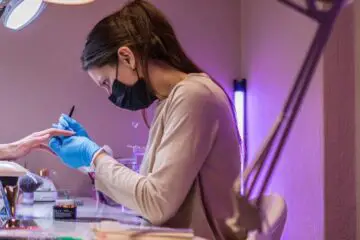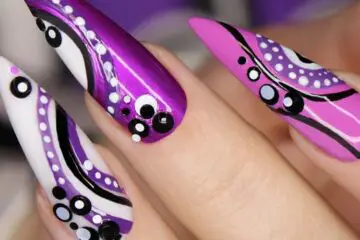Do manicures hurt | If you’ve recently had a manicure, you may have experienced some discomfort. Whether the feeling was mild or outright painful, it begs the question – do manicures hurt? In this article, we take a look at why nails may be sensitive after a manicure to help you understand your experience and keep those polished digits looking fabulous! Read on to find out why nails hurt after a manicure and what you can do about it.
How to Avoid Manicure-Related Pain
To avoid pain due to trauma, make sure that the nail technician is experienced and gentle. If you plan on getting an intricate design or long nails, consider going to a salon rather than a home manicurist for better results. To avoid allergic reactions, only use hypoallergenic products and have your nail technician apply a small amount of each product to your skin before applying it to your nails.

Qualities of Good Nail Products
Look for nail products that are labeled as “3-Free”, meaning they do not contain formaldehyde, dibutyl phthalate (DBP) or toluene. These chemicals can be damaging to the skin and cause allergies or sensitivities when applied on nails during manicures.
Caring for Nails After a Manicure
To ensure your nails remain healthy and happy after a manicure, it is important to moisturize them regularly with a nourishing oil or lotion. Additionally, make sure to keep the nails trimmed and clean of any dirt or debris that can cause bacteria or fungal growths.
Questions to Ask Before Getting Manicures
Before getting a manicure, ask your nail technician questions such as whether they use disposable tools and files; if they sterilize their equipment between customers; how long their products last before they need to be replaced; and what types of products they use. This will help you determine whether the salon is reputable and safe for you to receive a manicure.
Benefits of Professional Manicures
Professional manicures can help keep your nails looking their best, as they often involve filing and buffing the nails to remove ridges or jagged edges. Additionally, trained professionals will be able to create intricate designs or extensions in a way that is not possible with home kits.
Risks of DIY Manicures
While doing your own manicure at home may seem like a money-saver, it can actually end up costing you more if done incorrectly. Improper technique can lead to weakened nails or infections from cutting yourself while trying to shape the nail too aggressively.
Pros & Cons of Gel Manicures
Gel manicures offer a long-lasting glossy finish and do not chip as easily as traditional nail polish, but can be more damaging for your nails over time. If you choose to get gel nail extensions, make sure to use products that are free from harsh chemicals.
How to Enjoy Manicures Pain-Free
To enjoy manicures pain-free, follow these steps: choose the right salon or nail technician; select hypoallergenic products; moisturize nails regularly; avoid aggressive trimming; monitor for signs of allergies or infections; and ask questions before beginning the treatment. Doing so will help ensure that you are able to enjoy a manicure without any pain or discomfort.
What are the disadvantages of manicure?
Manicures can be expensive and time consuming. Additionally, if done improperly, manicures can cause skin irritation or allergies due to the chemicals in the products used. Over-filing of nails can weaken them and lead to infection as well. If gel nail extensions are used, they may need to be reapplied every few weeks which is costly. Lastly, manicures can put you at risk of catching nail fungus if the salon or technician does not use proper sterilization techniques.
Why is it important to be in the correct position for manicure treatments?
It is important to be in the correct position when receiving a manicure as it allows your nail technician to work comfortably and efficiently. It also ensures that the products are applied correctly and that the nails are filed evenly and thoroughly. Being in the correct position also helps reduce any discomfort or pain that may be experienced during the manicure. Finally, it enables your nail technician to obtain a better view of what they are doing, resulting in a cleaner and more professional job.
How do you stop a manicure from hurting?
The best way to stop a manicure from hurting is to ensure that the nail technician is using the correct techniques and products. Use hypoallergenic products, avoid aggressive trimming or filing, and ask questions before beginning treatment. Additionally, make sure to take regular breaks during the process so your skin can recuperate from any sensitivity caused by the products used. If you feel that the manicure is becoming too painful, speak up and let your technician know.
Conclusion | do manicures hurt
Manicures can be a luxurious and enjoyable experience, but if done improperly can cause pain or discomfort. To prevent this from occurring, do your research beforehand to find a reputable salon and nail technician; use hypoallergenic products; take regular breaks during the process; and speak up if you are feeling any pain or discomfort. Following these steps will help ensure that your manicure is both safe and enjoyable.
This article has been written to provide information on whether or not manicures hurt. It should not be used as a substitute for professional medical advice, diagnosis or treatment.


